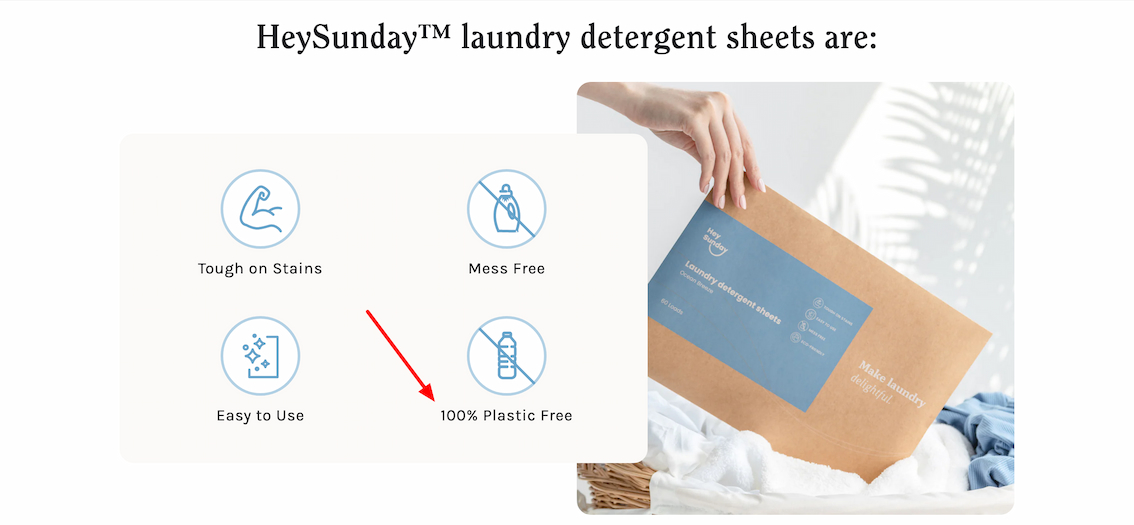
HeySunday’s Plastic-Free, Biodegradable Claims
Company makes marketing changes following TINA.org inquiry.
Ad regulator finds term potentially misleading in context of radio ad.
The U.K.’s Advertising Standards Authority has ruled that a Virgin Atlantic radio ad that used the term “100% sustainable aviation fuel” could have misled consumers into thinking that the fuel used in a single, non-commercial flight last November was 100% sustainable and did not have any negative environmental impacts.
Many consumers do not have a clear understanding of sustainable aviation fuel, or SAF, which unlike fossil fuel is derived from sustainable sources like corn starch and animal fats but which still produces significant greenhouse gas emissions over its lifecycle, the ad regulator said in a decision announced last week.
The ASA said a consumer opinion survey Virgin had commissioned during the course of its inquiry “confirmed the limited knowledge and lack of clarity amongst consumers about the environmental impact of sustainable aviation fuel, both in general and specifically after listening to the ad.”
While 68% of respondents said they understood from the ad that sustainable aviation fuel was “significantly” or “somewhat” better for the environment than traditional jet fuel, a further 15% understood it had the same impact as jet fuel, and 6% understood it was “somewhat” or “significantly” worse for the environment; 11% understood that sustainable aviation fuel had zero environmental impact.
In fact, SAF produces reduced, but still significant, CO2, nitrous oxide and other climate-impacting emissions during flight, the ASA said. And there are other potentially negative environmental impacts, such as the diversion of biofuels from other sectors that might then revert back to fossil fuels, the ASA noted.
The U.K. regulator told the airline to ensure that future ads referring to the use of SAF include qualifying information about the environmental impact of the alternative fuel.
In response to a request for comment, a Virgin spokesperson said SAF is “a safe, 100% drop-in replacement for fossil fuel” and “one of the most immediate levers to decarbonising long haul aviation,” though the company acknowledged that “100% adoption across every flight may be decades away.”
“While we are disappointed that the ASA has ruled in favour of a small number of complaints, we remain committed to open, accurate and transparent engagement on the challenge of decarbonisation,” the spokesperson said.
Virgin did not respond to a question about whether language regarding the environmental impact of SAF that the Internet Archive shows was added to its Flight100 page sometime after June came in response to the ASA’s inquiry. The language states:
Whilst SAF doesn’t completely remove carbon and non-carbon emissions from flying, it is a big improvement compared to fossil jet fuel.
Nor did Virgin respond to a question about why the language hasn’t been added to other ads like this post pinned to the top of the company’s Instagram page.
While Virgin stated in the challenged radio ad that the company’s mission is to become “the world’s first commercial airline to fly transatlantic on 100% sustainable aviation fuel,” the touted flight was a non-commercial flight and the term “100% sustainable aviation fuel” is up for interpretation.
And while SAFs are at the forefront of the airline industry’s efforts to “decarbonize” aviation, as Virgin acknowledged in its response to our inquiry, full adoption may be decades away. Until then, flights will continue to be powered by fossil fuels.
Find more of our coverage on companies accused of greenwashing here.
Our Ad Alerts are not just about false and deceptive marketing issues, but may also be about ads that, although not necessarily deceptive, should be viewed with caution. Ad Alerts can also be about single issues and may not include a comprehensive list of all marketing issues relating to the brand discussed.
Company makes marketing changes following TINA.org inquiry.
Lawsuit tells a different story about the treatment of workers on Starbucks’ source farms.
TINA.org has tracked more than 150 lawsuits alleging greenwashing.

